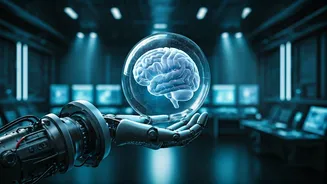Embrace Critical Thinking
In an era where AI can process vast amounts of data, the ability to analyze information, identify patterns, and form sound judgments becomes paramount.
Critical thinking involves evaluating information objectively, recognizing biases, and making informed decisions. Developing this skill allows individuals to dissect complex problems, question assumptions, and formulate well-reasoned solutions that AI, in its current state, struggles with. This will be the foundational skill for all the others.
Cultivate Creativity and Innovation
AI excels at automating repetitive tasks, but it lacks the human capacity for genuine innovation. The ability to generate novel ideas, think outside the box, and develop creative solutions will set humans apart. Creativity encompasses the ability to connect seemingly unrelated concepts, experiment with new approaches, and envision possibilities. This involves fostering a mindset of curiosity, embracing experimentation, and learning from failures, which can lead to groundbreaking discoveries and improvements.
Master Complex Problem-Solving
While AI can solve structured problems, humans excel at tackling complex, ambiguous situations with multiple variables. This skill involves breaking down intricate challenges, identifying root causes, and devising effective strategies. This includes the ability to adapt to changing circumstances, think strategically, and consider various perspectives. Mastering complex problem-solving involves the ability to identify the problem and then design, analyze, interpret and evaluate the solution.
Enhance Emotional Intelligence
Emotional intelligence, or EQ, which includes self-awareness, empathy, and social skills, will become increasingly valuable in the workplace. As AI handles more routine tasks, human interactions become more critical. EQ enables individuals to understand and manage their own emotions, build strong relationships, and navigate social dynamics effectively. This involves being able to recognize others’ emotions, build rapport, and communicate clearly and persuasively, which is essential for collaboration, leadership, and customer service.
Adaptability and Flexibility
The job market is continually evolving, demanding a capacity for continuous learning and adaptation. People need to be open to new technologies, changing roles, and acquiring new skills throughout their careers. Adaptability involves embracing change, quickly learning new concepts, and being comfortable with ambiguity. This requires a growth mindset, a willingness to step outside one's comfort zone, and the ability to pivot and learn from mistakes, ensuring individuals remain relevant and competitive.
Develop Communication Skills
Effective communication is fundamental, especially as AI takes over basic tasks. Humans must articulate ideas clearly, present information persuasively, and foster understanding. This involves verbal and written communication, as well as non-verbal cues. Communication skills also encompass active listening, empathy, and the ability to tailor messages to different audiences. In a world where collaboration is essential, clear and effective communication will be a crucial skill for team success and individual achievement.












